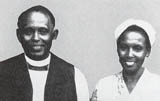Classic DACB Collection
All articles created or submitted in the first twenty years of the project, from 1995 to 2015.Sabiti, Erica

The Very Reverend Erica Sabiti, Archbishop of the Province of Uganda, was born in Rwebishuru, Uganda. His father, a chief in Ankole, died while he was young and his stepbrother Ernest Katungi, became his guardian.
After his primary education, Erica attended King’s College, Budo. He was attracted by the Christian teaching he received there and was given an impetus for his life by the words of Jesus quoted in one of the chapel windows: “I did all this for you, what have you done for me?” After his secondary education he returned to Ankole to become a primary school teacher, albeit untrained. In 1925, he attended a teacher training course at Makerere University College. At that time he met and married his first wife, Georgina Kachanda. Her death from malaria left him devastated and questioning God’s love for him.
Later Erica married Geraldine, born in 1914, daughter of Yosiya Kamuhigi who was a former armed bodyguard of the Omukama of Tooro and an ordained clergyman in the Church of Uganda. Geraldine attended kindergarten, then Tooro Girls’ Primary School, later to become Kyebambe Girls’ School. In 1933, Geraldine trained as a teacher at Gayaza High School.
After training at the Bishop Tucker Theological College, Erica was ordained in 1933. He was in the first group to be trained in English. He worked for a year in the Cathedral Church at Namirembe where his ministry was particularly well received, enhanced by his remarkable fluency in English. Following this experience, Erica was put in charge of the church at Bweranyangi, a large parish in Ankole.
In 1939, Erica accompanied the bishop of Uganda on a visit to the churches in Rwanda and Burundi where he came into contact with some balokole (saved ones) of the East African Revival. Erica’s ministry was transformed, as was his family life with Geraldine. Thereafter he became a leading figure in the East African Revival. He shared in the leadership of many missions and conventions in East Africa and visited India with Bishop Festo Olang of Kenya.
After several years as rural dean, Erica was appointed suffragan bishop in the Rwenzori diocese. During this time Erica visited England to gain experience first under Bishop Donald Coggan, who later became Archbishop of Canterbury, then under Bishop Maurice Wood. On his return to Uganda, he was consecrated bishop of Rwenzori Diocese. Erica introduced into this diocese an energetic programme of self-help including a Christian Rural Service and a Young Farmers’ Scheme. He was very courageous in his opposition to the political tyrannies pursued by President Idi Amin. One English newspaper commented that “he was fortunate to escape the fate of his martyred successor in the archbishopric, Janani Luwum.”
In 1965, the expatriate archbishop of the Uganda Province, Leslie Brown, retired from office and Erica was chosen by the Uganda bishops to succeed him. He was the first Ugandan to be archbishop of the province and, in the process, encountered bitter opposition from those who would tolerate only a Mugandan bishop in the Namirembe Diocese. This led to a grave situation which was only resolved when President Idi Amin summoned all the bishops of the province to Kampala to settle the issue. In a memorable meeting, the nine diocesan bishops confessed the sins which had contributed to the divisions in the church and unitedly recognised Erica as archbishop. However, he remained bishop of Rwenzori, some 200 miles from the capital.
During his service as archbishop, Erica promoted many initiatives in the church, including an emphasis on the education of the clergy, an effective handling of the church’s finances as it faced dwindling income from overseas, and a legal settlement of disputed church property. He was troubled by, and did much to mediate in a separatist movement called the okuzukuka (awakened). He was a very capable administrator, strong in his convictions, fearless in denouncing racial discrimination and social injustices and, at the same time, very gracious in personal relationships.
Erica entered into full retirement as archbishop in June 1974 but continued to be very active despite failing health.
H. H. Osborn
Bibliography
H. H. Osborn, Pioneers in the East African Revival (Apologia, 2000).
This article, submitted in 2002, was written for the DACB by Dr. H. H. Osborn, author of the book Pioneers in the East African Revival.



